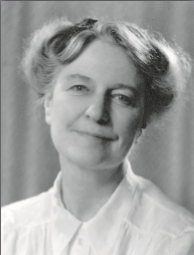Nora K. Chadwick
Nora K. Chadwick | |
|---|---|
 | |
| Born | Nora Kershaw 28 January 1891 Lancashire, England |
| Died | 24 April 1972 (aged 81) Cambridge, England |
| Nationality | British |
| Occupation | Medievalist |
| Notable work | The Druids |
Nora Kershaw Chadwick CBE FSA FBA (28 January 1891 – 24 April 1972)[1] was an English philologist who specialized in Anglo-Saxon, Celtic and Old Norse studies.
Early life and education
[edit]Nora Kershaw was born in Lancashire in 1891, the first daughter of James Kershaw and Emma Clara Booth, married in 1888. Nora's sister Mabel, born in 1895, converted to Catholicism and became a Carmelite nun.[2]
She received her undergraduate degree from Newnham College, Cambridge (where she was later an Honorary Life Fellow) and lectured at St Andrews during World War I. She returned to Cambridge in 1919 to study Anglo-Saxon and Old Norse under Professor Hector Munro Chadwick. They were married in 1922.[3] Nora's mother and stepfather and Enid Welsford were the only wedding guests.[2]
The Chadwicks turned their home into a literary salon, a tradition which Mrs. Chadwick maintained after the death of her husband in 1947.[3]
Career
[edit]Most of her life was spent on research, in her later years primarily on the Celts.[3] She was University Lecturer in the Early History and Culture of the British Isles at the University of Cambridge from 1950 to 1958. She received honorary degrees from the University of Wales, the National University of Ireland and the University of St Andrews, and was made Commander of the Order of the British Empire in 1961.[3] In 1965 she delivered the British Academy's Sir John Rhŷs Memorial Lecture.[4]
Chadwick took an interdisciplinary approach and wrote on many topics; she demonstrated influentially the study of multiple "early cultures of north-west Europe" and brought comparative evidence to bear on heroic literature. Nora Chadwick is best known for her work on the Celts, particularly on the earliest period.[5]
Bequest
[edit]Nora Chadwick died in Cambridge; she left a sum to the University of Cambridge to endow a readership in Celtic Studies.[6]
Publications
[edit]She published the first full English translation of Hervarar saga ok Heiðreks together with other sagas and ballads in Stories and Ballads of the Far Past (1921), as well as a translation of the poem Hlöðskviða found within Heidrik's saga.
- Kershaw, Nora (1921), Stories and Ballads of the Far Past, Cambridge University Press, pp. 79–150, e-text
- Kershaw, N., ed. (1922), "13. The Battle of the Goths and the Huns", Anglo-Saxon and Norse poems, Cambridge [Eng.] The University press
With her husband, she published the three volume work The Growth of Literature between 1932–40.
- The Ancient Literatures of Europe, vol. I, 1932[7]
- Russian Oral Literature, Yugoslav Oral Poetry, Early Indian Literature, Early Hebrew Literature, vol. II, 1936
- The Oral Literature of the Tatars and Polynesia, etc., vol. III, 1940[5]
She also wrote The Beginnings of Russian History, an enquiry into sources (1946).
Chadwick collaborated with V. M. Zhirmunsky on a revision of the part of volume III that deals with epic poetry in Central Asian languages. The revised text was published separately in 1969 as Oral Epics of Central Asia.[8]
In 1955 she published Poetry and Letters in early Christian Gaul.
Chadwick wrote about Celtic Britain and Breton history, and collaborated with Myles Dillon and Kenneth H. Jackson.
- Early Scotland (1949); Introduction, pages xi–xxvi, by Nora Kershaw Chadwick
- Studies in Early British History (editor and co-author, 1954)[9]
- Celtic Britain (ancient people and places) (1963)
- The Age of Saints in the Celtic Church (1964)[10]
- The Colonization of Brittany from Celtic Britain (1965)[11]
- The Druids (1966)[12]
- The Celtic Realms (1967, with Myles Dillon)[13]
- The Celts (1970, with an introductory chapter by Dr. J.X.W.P. Corcoran: 'The Origins of the Celts: The Archaeological Evidence')[14] 1997 pbk edition
On Anglo-Saxon language and literature:
- The Study of Anglo-Saxon (1955, with her husband)
- "The Monsters and Beowulf" (1960), in which she suggests that the monsters in Beowulf are drawn entirely from Scandinavian tradition.[15]
A list of the publications of Hector and Nora Chadwick was printed for her 80th birthday in 1971.
References
[edit]- ^ CHADWICK, Nora Kershaw, Who Was Who, A & C Black, 1920–2015; online edn, Oxford University Press, 2014
- ^ a b Chance, Jane, ed. (2005). "Chapter 27. "An Extraordinary Sense of Powerful Restlessness" Nora Kershaw Chadwick (1891–1972) by Sandra Ballif Straushaar". Women Medievalists and the Academy. Univ of Wisconsin Press. pp. 367–379. ISBN 9780299207502.
- ^ a b c d Davidson, H. R. Ellis (1972). "Nora Kershaw Chadwick". Folklore. 83 (3): 254–55. ISSN 0015-587X. JSTOR 1259552.
- ^ "Sir John Rhŷs Memorial Lectures". The British Academy. text
- ^ a b Löffler, Marion (2006). "Chadwick, H.M. and Nora K.". In Koch, John T. (ed.). Celtic Culture: A-Celti. Celtic Culture: A Historical Encyclopedia. Vol. 2. Santa Barbara, California: ABC-CLIO. pp. 397–98. ISBN 9781851094400.
- ^ Statutes and Ordinances of the University of Cambridge. University of Cambridge. 2008. p. 747. ISBN 9780521731492.
- ^ Ashley-Montagu, M. F. (1938). "Review of The Growth of Literature. Volume I The Ancient Literature of Europe by H. Munro Chadwick and N. Kershaw Chadwick". Isis. 29 (1): 196–197. doi:10.1086/347439. ISSN 0021-1753.
- ^ Lang, D. M. (1970). "Book Review: Oral Epics of Central Asia by N. K. Chadwick & V. Zhirmunsky". Slavonic and East European Review. 48 (111): 291.
- ^ Magoun, F. P. Jr. (October 1955). "Review: Studies in Early British History by Several Authors by Nora Kershaw Chadwick". Speculum. 30 (4): 628–31. doi:10.2307/2849623. JSTOR 2849623.
- ^ Ó Fiaich, Tomás (1966). "Reviews: The Age of the Saints in the Early Celtic Church by Nora Kershaw Chadwick; Irish Monks in the Golden Age by J. Ryan". Studia Hibernica (6): 195. JSTOR 20495860.
- ^ Wrenn, C. L. (1968). "Book Review: The Colonization of Brittany from Celtic Britain by Nora K. Chadwick". Medium Ævum. 37: 105–106. doi:10.2307/43627413. JSTOR 43627413.
- ^ Turner, Ralph V. (October 1966). "Review: The Druids by Nora K. Chadwick". The American Historical Review. 72 (1): 136–37. doi:10.2307/1848194. JSTOR 1848194.
- ^ Thomson, Derick S. (October 1969). "Review: The Celtic Realms by Myles Dillon, Nora K. Chadwick". The Scottish Historical Review. 48 (146, Part 2): 174–76. JSTOR 25528803.
- ^ Powell, T.G.E. (June 1971). "Review: Nora Chadwick: The Celts. With an introductory chapter by J. X. W. P. Corcoran". Antiquity. 45 (178): 152. doi:10.1017/S0003598X00069350.
- ^ Eliason, Norman E. (April 1961). "Review: The Anglo-Saxons. Studies in Some Aspects of Their History and Culture Presented to Bruce Dickins by Peter Clemoes". The Modern Language Review. 56 (2): 238–39. doi:10.2307/3721913. JSTOR 3721913.
External links
[edit]- British medievalists
- British women medievalists
- Alumni of Newnham College, Cambridge
- Academics of the University of St Andrews
- Academics of the University of Cambridge
- Commanders of the Order of the British Empire
- Fellows of the Society of Antiquaries of London
- Fellows of the British Academy
- 1891 births
- 1972 deaths
- English philologists
- Anglo-Saxon studies scholars
- Germanic studies scholars
- Old Norse studies scholars
- Celtic studies scholars
- British salon-holders


